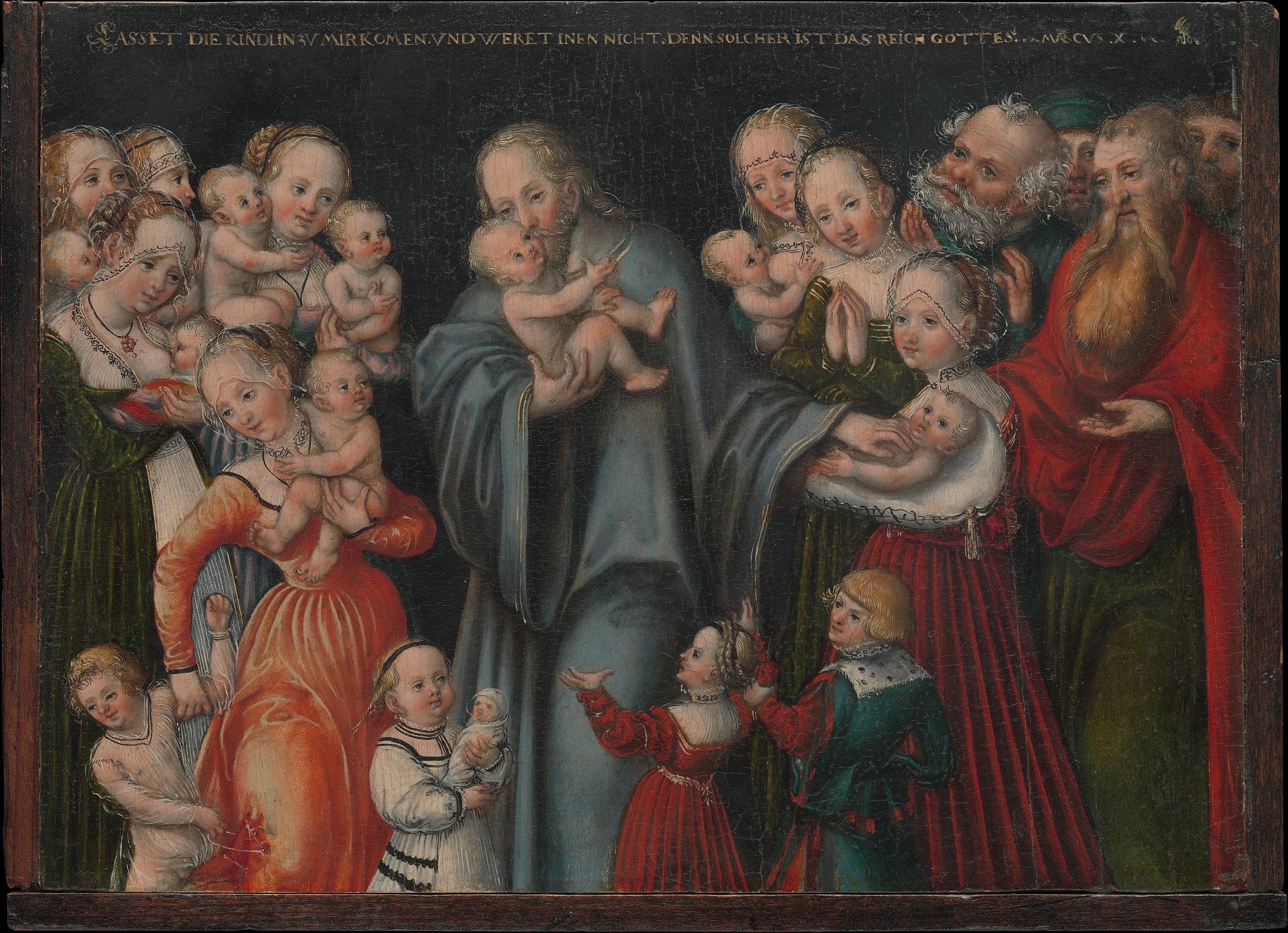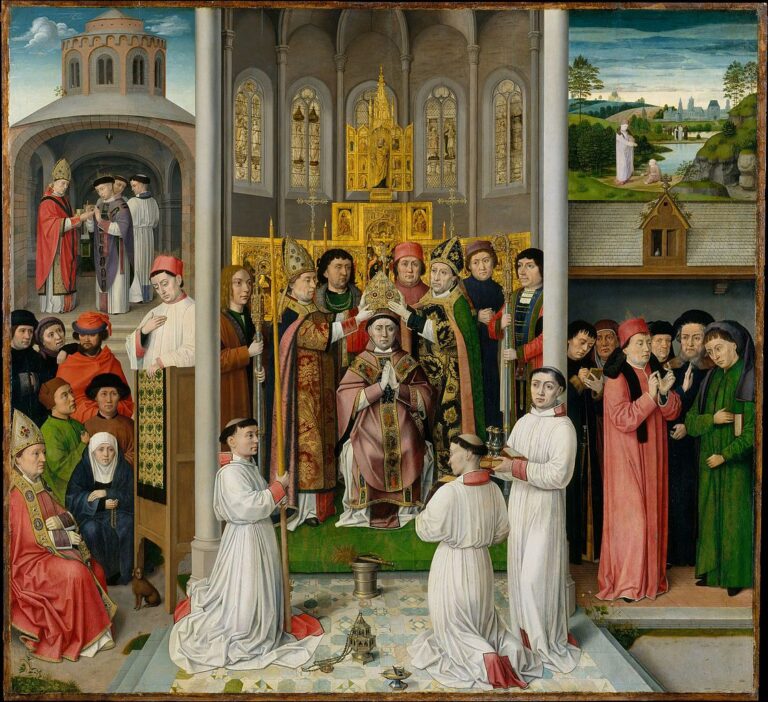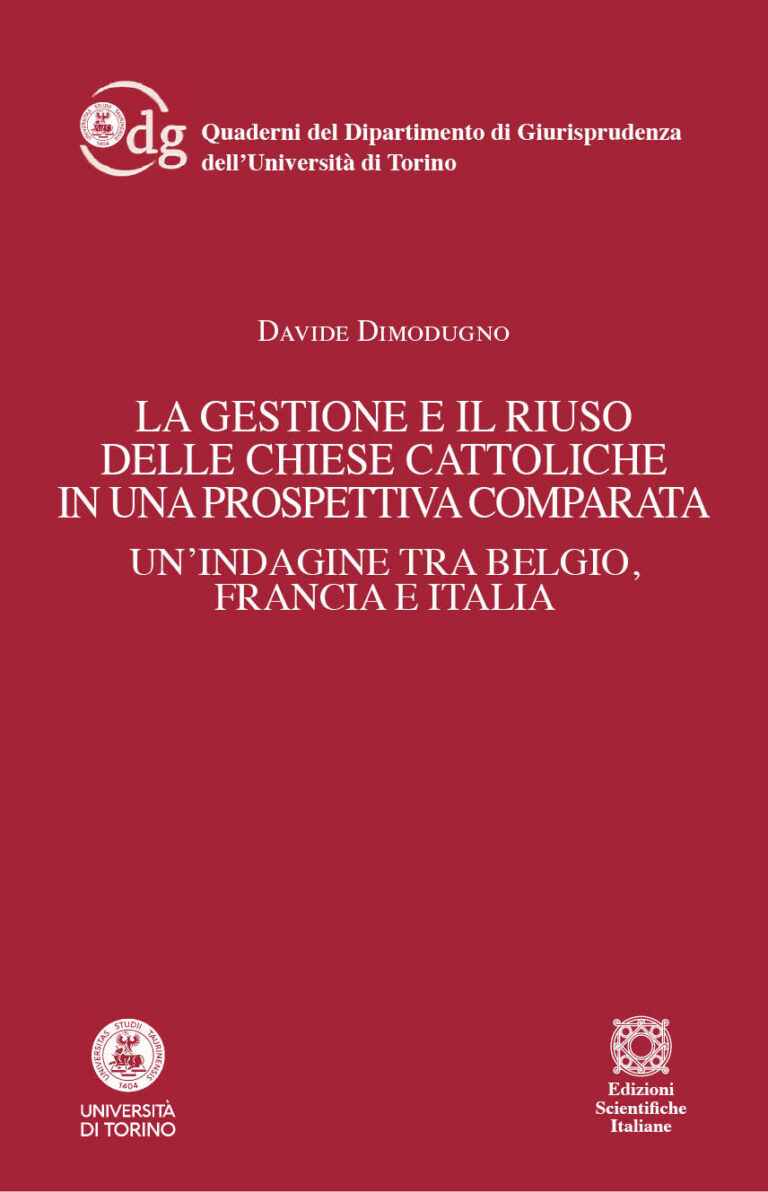
Abortion, IVF, and the Moral Status of the Embryo: The Missing Middle
Karey Harwood
“Christ Blessing the Children” by Lucas Cranach the Younger (CC0 1.0).
This article is part of our “Religious Perspectives on Assisted Reproduction and Surrogacy” series. If you’d like to explore other articles in this series, click here.
In April 2024, the Dicastery for the Doctrine of the Faith issued Dignitas Infinita, the most recent articulation of Catholic doctrine regarding the meaning and importance of human dignity. Consistent with past teachings, including the Instructions Dignitas Personae (2008) and Donum Vitae (1987), the Declaration Dignitas Infinita reiterated the Church’s position on the moral status of the human embryo: “the dignity of every human being has an intrinsic character and is valid from the moment of conception until natural death.” This understanding of the human embryo has underwritten the Church’s position on abortion—at least since the late 19th century—as well as its position on in vitro fertilization (IVF). From the earliest adoption of IVF as a treatment for infertility in 1978, the Church has consistently opposed its use, in all forms, as contrary to human dignity.
However, contrary to popular belief, drawing a bright moral line at the “moment of conception” has not always been the Church’s approach to abortion. Nor has the Church rested the entirety of its objections to IVF on the moral status of the human embryo. The dignity of human procreation also depends on the Church’s understanding of marriage and what is owed to the child: “A true and proper right to a child would be contrary to the child’s dignity and nature. The child is not an object to which one has a right, nor can he be considered as an object of ownership: rather, a child is a gift, ‘the supreme gift’ and the most gratuitous gift of marriage, and is a living testimony of the mutual giving of his parents. For this reason, the child has the right, as already mentioned, to be the fruit of the specific act of [his parents’ conjugal love]; and he also has the right to be respected as a person from the moment of his conception.”
Setting aside the focus on the human embryo for a moment, one can appreciate the Church’s general description of human dignity to the extent that it provides a foundation for human rights and equality among living persons. Human dignity is intrinsic and inalienable (“[o]nly this inalienable character of human dignity makes it possible to speak about human rights.”) It is not contingent on the possession of certain traits: “to be created in the image of God means to possess a sacred value that transcends every distinction of a sexual, social, political, cultural, and religious nature” and includes “the vulnerable, the most insignificant, the outcast, the oppressed, the discarded, the poor, the marginalized, the unlearned, the sick, and those who are downtrodden by the powerful” as well as those who are incarcerated. In Dignitas Infinita, this vision of human dignity leads to an explicit condemnation of torture, human trafficking, discrimination against people with disabilities, and the marginalization of women, and it notably leads to a condemnation of sexual abuse, “starting from within” [the Church]. It also calls for “equal pay for equal work,” “equality of spouses with regard to family rights,” and affirms the dignity of every person “regardless of sexual orientation.”
Indeed, as in previous documents, Dignitas Infinita claims for the Catholic Church a superior understanding of human dignity: “no anthropology equals that of the Church regarding the human person—particularly concerning the person’s originality, dignity, the intangibility and richness of the person’s fundamental rights, sacredness, capacity for education, aspiration to a complete development, and immortality.” The detailed description of human dignity instructs the reader on the term’s deeper meaning and complexity, including clarifying the distinctions between ontological, moral, social, and existential dignity. But Dignitas Infinita also criticizes the many areas where human dignity is disrespected in the modern world. Quoting Pope Francis, the document states: “In a world in which so much is said about rights, it seems that the only thing that has any rights is money.” To its condemnation of poverty, war, human trafficking, and many other cases of abuse, Dignitas Infinita adds a controversial rejection of “gender theory” and sex change, labeling the desire for self-determination in the domain of gender to be an example of the “age-old temptation to make oneself God.” It also labels the practice of surrogacy as “deplorable” for depriving the child of a “fully human origin” and treating the woman as “an instrument of another.”
Yet, if it is true that human dignity is embattled on so many fronts, it is noteworthy that the Church invests the human embryo with such symbolic significance. In the discussion of abortion, “unborn life” is framed as the lynchpin upon which all other human rights depend: “It must, therefore, be stated with all force and clarity, even in our time, that ‘this defense of unborn life is closely linked to the defense of each and every other human right.”
Nothing in this articulation of the moral status of the embryo is new. As in past Church documents, what is missing is any deference to the living person upon whom the early embryo is entirely physically dependent. Neither are there any insights gleaned from an earlier era when the Church recognized fetal movement or “quickening” as a significant moral line for assessing abortion. Instead, we see in Dignitas Infinita, as in other 21st century statements from the Church, an intense anxiety about waning respect for human dignity: “Human beings are ends in themselves and never a means of resolving other problems. Once this conviction disappears, so do solid and lasting foundations for the defense of human rights, which would always be subject to the passing whims of the powers that be.”
Similarly fueled by their own anxiety about human dignity, Southern Baptists, who represent the largest Protestant denomination in the United States, voted in June 2024 to oppose in vitro fertilization. Previously silent on the ethics of IVF, Southern Baptists were moved at their annual denominational meeting to condemn the destruction of unused or excess embryos that commonly result from the in vitro fertilization process. Stopping short of condemning IVF altogether, the group encouraged their membership “to only utilize infertility treatments and reproductive technologies in ways consistent with the dignity of the human embryo.”
This vote was a significant change, signaling to many observers that evangelical Christians in the United States are taking another step toward extremism. As recently as 1968, evangelical Protestant leaders affirmed the necessity of abortion: “Whether or not the performance of an induced abortion is sinful we are not agreed, but about the necessity and permissibility for it under certain circumstances we are in accord.” They also affirmed the permissibility of contraception: “The partners in marriage should have the privilege of deciding the number of children to have in their family.” However, as has been well documented, evangelical support for family planning and tolerance for diverse views on the morality of abortion gave way to staunch opposition to abortion in the 1980s. The rise of the Christian right accompanied the politicization of the abortion issue during the Reagan years. Now, in 2024, we see a further narrowing of views, including Republican opposition to birth control and a new questioning of IVF.
To some, including some Southern Baptists, IVF differs from abortion because it is aimed at creating new life, even if some embryos are lost in the process. When they voted, the Southern Baptists were far from unanimous in their opposition to IVF. In fact, many individuals spoke up passionately in its favor, describing how they owed the existence of their own children to this technology. IVF continues to be a popular procedure in the United States, with demand increasing yearly since the law first required success rates to be tracked. Assisted reproductive technologies were responsible for the birth of over 97,000 babies in 2021, according to the Centers for Disease Control and Prevention’s most recent ART Report.
However, it would seem that opposition to IVF is now being framed as a logical extension of opposition to abortion. Opposition to both appears to depend on believing that: (1) life begins at conception and (2) the earliest human embryo has the same moral status as a living person. If anything, some evangelical leaders feel members of their group have been slow in connecting the dots between abortion and IVF, unlike the Catholic Church, which has opposed IVF from the beginning. Notably, the Southern Baptist vote followed four short months after the Alabama Supreme Court declared embryos to be “unborn persons,” which followed two short years after the overturning of Roe v. Wade. However, even the Catholic Church has historically addressed moral issues beyond merely the moral status of the human embryo in its discussions of IVF, including the moral significance of separating sex and procreation and the problems associated with viewing a child as an object to which one has a “right.”
So, if conservative religious voices, particularly those of evangelical Christians in the United States, are moving more narrowly to focus on the moral status of the human embryo, granting it the same moral status as a living person, what is going on? What are they reacting to?
One obvious possibility that has been widely discussed is that conservative Christians are doubling down on extremist views as they react to a loss of cultural power. I would like to suggest another possibility, perhaps more charitable. We are witnessing a revolution in reproduction that is causing moral vertigo. As predicted by Christian ethicists Paul Ramsey, Oliver O’Donovan, and others, the advent of “artificial” reproduction has indeed created a “fundamental change in attitude toward human life” even as the use of IVF has become normalized and routinized. “We live in a society that does not tolerate fate, in a society in which apparently nothing has to be the way it is.” On some occasions, this mindset appears to have produced decisions that erode human dignity.
For example, there are rare cases of intended parents who hire a gestational surrogate and then later change their minds, no longer wanting the baby they conceived. Sometimes, the circumstances of the intended parents change, disrupting their desire for the baby. Sometimes, there is a diagnosis of a fetal abnormality. Sometimes, multiple fetuses develop when only one is wanted. Should the intended parents be allowed to get out of their contract with the surrogate mother?
There are the rare cases of “false children”– embryos made with the wrong sperm. Whose responsibility do these children become? How should they understand their own existence? That the rare cases of reneging on surrogacy contracts or wanting compensation for “false children” might be outliers in an otherwise uneventful use of reproductive technologies does not eliminate the fact that some uses are morally unsettling.
Additionally, there are worries about a eugenic mindset creeping into IVF. Arguably, this mindset was endemic to assisted reproduction from the beginning of IVF. Should we be concerned that companies claim to be able to screen embryos for polygenic traits, like intelligence? Should we be concerned if some people approach the selection of donor gametes with a desire to improve their own genes?
Then, there are uses of assisted reproductive technologies by persons who may be physically fertile but lack a partner, have a same-sex partner, or in some other way want to form a non-traditional family. Legal and philosophical scholars, including Judith Daar and Kimberly Mutcherson, have argued for the reconceptualization of reproductive freedom not as a freedom from interference–a negative liberty–but a positive right to reproduce, an entitlement. Is it possible to endorse the right of LGBTQ persons to have families of their own without also endorsing the view of the child as an object to which one has a “right”? In “Made, Not Begotten: IVF and the Right to Life Under Conditions,” philosopher Susanne Kummer writes, “[N]o one should be prevented from founding a family; this is enshrined in international human rights law. However, this “right of defense” conversely/by implication does not give rise to a “right of claim,” neither against the partner nor against the child.”
Legal scholar Katherine Drabiak captures what seems unsettling about termination clauses in surrogacy contracts, to take one example, and does so without reliance on religious claims: “Termination clauses in surrogacy contracts categorize both surrogates and children as conditionally precious: surrogates are a blessing (only when they obey); and children are a gift (but only the right kind: disability-free, not too many, and not an inconvenient tie to a former romantic partner). Termination clauses shatter the boundaries of ordinary parental obligations and expectations, and they constitute the very essence of dehumanization and detachment.”
In the face of these examples, what some of us hope for is a compromise: to take seriously the worry that human life is being viewed as “conditionally precious” without insisting that the early human embryo has the status of a living person and without taking away the rights of adults to found a family.
If debates about the moral status of the early human embryo are growing more polarized and entrenched, what could help us find our way back to civil deliberation and compromise? A starting point would be to ask in good faith what each side is most worried about and treat the answer respectfully. Beyond that, we must look for a lost middle ground that forges a new “civic and moral glue” in the face of values pluralism.
Philosopher Michael Sandel once suggested three possible ways to think about the moral status of the human embryo: “as a thing, as a person, or as something in between. To regard an embryo as a mere thing, open to any use we may desire or devise, misses its significance as nascent human life. One need not regard an embryo as a full human person in order to believe that it is due a certain respect.” Sandel then likened the embryo to an ancient sequoia tree, “a natural wonder worthy of appreciation and awe,” and suggested we resist the simple binary that “everything is either a person, worthy of respect, or a thing, open to use.” Instead, he counseled, “we would do better to cultivate a more expansive appreciation of life as a gift that commands our reverence and restricts our use.”
If we could add to this reverence for life an additional requirement of special respect for the existing life of the mother–specifically for the bodily autonomy of the living person in whom the potential life develops–perhaps we could begin to build a middle ground. This requirement for special respect could include reasonable regulations that are specific, nuanced, and responsive to individual circumstances. It could reconsider the trimester framework of Roe and ensure a new regulation was based on sound scientific, moral, and legal foundations.
One need not believe that life is a gift from God to appreciate the desire to put human life in a separate category from those things subject to use as “mere means.” With that in mind, perhaps it was not unreasonable for the Southern Baptist Convention to claim “[i]t is within the jurisdiction of the state to promote the good of families and restrain the evil of treating these human beings as disposable or simply a means to an end.” What is unreasonable is translating these goals into severe restrictions on abortion or IVF.
Likewise, it is helpful to be reminded by the Catholic Church that “reason too can fall prey to distortions, as when it is manipulated by ideology, or applied in a partial way that fails to take full account of the dignity of the human person. Such misuse of reason, after all, was what gave rise to the slave trade in the first place and to many other social evils, not least the totalitarian ideologies of the twentieth century.” What is unreasonable is subordinating the dignity of persons with uteruses in pursuit of respecting human dignity “beyond all circumstances.” We can find a better way forward. ♦

Karey Harwood is an associate professor of religious studies in the Department of Philosophy and Religious Studies at North Carolina State University. Her work focuses on questions of ethics and values in human reproduction, parenthood, and education.
Recommended Citation
Harwood, Karey. “Abortion, IVF, and the Moral Status of the Embryo: The Missing Middle.” Canopy Forum, November 18, 2024. https://canopyforum.org/2024/11/18/abortion-ivf-and-the-moral-status-of-the-embryo-the-missing-middle/.
Recent Posts










